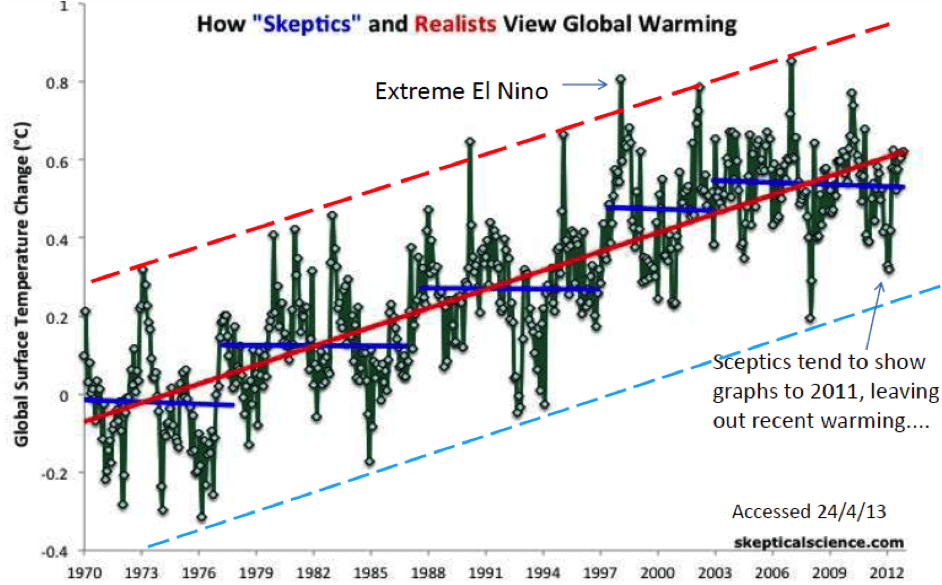Climate sceptics and denialists put forward many arguments to support their views that climate change is not a big issue. A core argument has been that warming has stopped over the past ten to fifteen years. Graph after graph that seems to support this position have been published. But the statistical basis of these graphs is very fragile.
This argument confuses the short term effects of weather cycles such as El Nino and La Nina and other factors such as volcanic activity with the long term effects of increasing concentrations of greenhouse gas emissions.
In this article I look at one example of this approach and show how very small changes in the selection of the period of temperature trends can give very different warming trend results. And the very variable temperature data means that presentation of relatively short term trends is simply not statistically valid. Longer time scales are needed to identify underlying trends.
In his blog of 2 November, high profile climate commentator Andrew Bolt reproduced two global temperature graphs, one for the past 12 years to September, showing ‘no warming’ and a second graph for the past 15 years showing ‘statistically insignificant’ warming since January 1998, shown below.
From the Bolt Blog
I thought it might be interesting to explore the sensitivity of these trends to the period of warming considered. I downloaded the monthly GISS/NASA data to September 2013, as shown in the red line on the Bolt graph, from two different starting dates, January 1996 and September 1997, then looked at the linear trends.
My graph shows that shifting the starting date of the period back by less than 2 years from September 1997 to January 1996 can increase the estimated rate of warming by 70 percent (from 0.063C/decade to 0.107C/decade). The September 2013 data point shows recent warming well above the long term average, which has begun to lift the warming trend calculation. If the dominance of La Nina events over the past decade is finishing, Mr Bolt may not be so keen to keep showing us warming trend graphs to support his argument that warming has stopped.
Focusing on short term warming trends, even as long as 15 years, is a risky business.
Mr Bolt’s comment that the warming trend over the past 15 years is ‘statistically insignificant’ seems to be his interpretation of the fact that the trend is ‘not statistically significant’. This term actually highlights the wide scatter of the data in the short term. So it’s not that the warming trend is necessarily trivial, it’s just that the data are very scattered, so firm conclusions can’t be drawn about the actual trend: you need a longer period of data to improve the statistical significance of a trend with such variability.
This is a good example of where the statistical interpretation of ‘not significant’ relates to the validity of the trendline’s representation of the data, not whether the actual trend in warming is ‘significant’ or not. Mr Bolt’s colloquial interpretation is erroneous from a statistical perspective. It may well be that the trend shown seems to indicate that the warming trend is very low. But the lack of statistical significance means that such a conclusion is speculative, due to the variability of the data.
For those who are interested, the R2 values (an indication of the statistical certainty of the trend line) are 0.157 for the line in my graph starting with January 1996 data, and 0.053 for the line starting in September 1997. A perfect statistical trend would have a value of 1 and, the lower the value, the less reliable is the trend line as an indicator of what is really happening. Clearly drawing conclusions from this data set is to draw a very long bow.
The sensitivity of the result to the exact period chosen is illustrated by comparison of Mr Bolt’s 12 and 15 year trends in his blog, as well as the difference between my GISS warming trends and Mr Bolt’s 15 year trend. My ‘low’ trend’s starting point is only a few months different from his, using the same data set, yet my trend is 0.063 degrees C per decade while his graph shows 0.070 degrees.
If we look back to the 1970s to get a more statistically valid picture, we see that there is a clear warming trend overall, the hottest periods show a clear trend towards greater warming and the ‘cold’ periods show ongoing warming. The problem is that periods of no warming or cooling have consistently been overwhelmed by the periods of strong warming. You just have to be a bit patient.
The graph below, from the scepticalscience website, with some additions by me, shows this longer term trend.
An interesting question is whether Mr Bolt is showing a lack of understanding of the interpretation of statistically ‘noisy’ data, whether this is a deliberate attempt to confuse and mislead, or there is some other explanation. I’ll leave that to others to judge.
Alan Pears works at RMIT in Melbourne.









